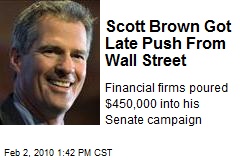'via Blog this'
Massachusetts' Senator from JP Morgan
After his upset election in January 2009, he became the key vote on the bill and leveraged that position to extract big concessions favored by banks, who had given generously to his campaign. First, Brown forced Democrats to strip from the bill a $19 billion bank tax. He also successfully pushed to water down a key reform -- the so-called 'Volcker rule' -- that was aimed at preventing banks from making risky trades with dollars backed by the government. The carve out helped large mutual funds in his state. In fact, Brown initially opposed the entire Wall Street reform bill and threatened to join the Republican filibuster of the legislation, which would have prevented it from even getting an up-or-down vote on the Senate floor. Meanwhile, as 'Brown and his Senate staff were working both publicly and behind the scenes to scuttle' these reforms, the senator took in $140,000 from financial firms -- 400 percent more than the average received by other GOP senators over the same time period -- according to the Boston Globe. A ThinkProgress analysis revealed that during his campaign, banks and their allies gave Brown's campaign huge 11th hour contributions and helped with a significant get-out-the-vote effort. He was also supported by outside groups friendly to Wall Street like the Club for Growth. Overall, the financial industry is Brown's second largest contributor." [ThinkProgress, "After Helping Banks Water Down Dodd-Frank, Scott Brown Tries To Claim He's A Wall Street Reformer," 9/13/11]
original post here: http://www.progressmass.org/press/conservatives-scott-brown-and-chris-christie-share-washington-republican-values-not-massachusetts-va.html
Also a potential issue: When Brown got all those donations from JPMorgan Chase, it coincided perfectly with when Chase officials were pressing Federal Reserve officials for a loophole in Dodd-Frank provisions meant to limit risky trading.
All of which smells slightly fishy to the Massachusetts Democratic Party, which has filed a Freedom of Information Act request with six government agencies, seeking to find out whether Brown was involved in helping JPMorgan Chase with its lobbying.
In a news release, the party said that Mr. Brown’s re-election campaign had received at least 30 contributions in February from employees of JPMorgan and the company’s federal political action committee. The New York Times reported last week that JPMorgan executives had met with Federal Reserve officials that month to express concerns about the restrictions on banks’ proprietary trading—known as Volcker Rule—that were called for in the Dodd-Frank financial regulation law.
The Times reported that the company had lobbied over months for loose restrictions that would allow banks to make big bets in their portfolios, including some of the types of trading that led to the $2 billion loss that JPMorgan reported last week. (According to people with knowledge of the losses, that figure is now reported to be at least $3 billion.)

No comments:
Post a Comment